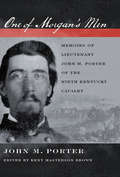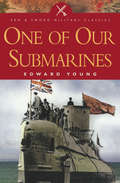- Table View
- List View
One Writer's Beginnings (The William E. Massey Sr. Lectures in the History of American Civilization 1983)
by Eudora WeltyThe author tells the story of her early life and offers guidance for those who aspire to write fiction.
One Writer's Beginnings: A Curtain Of Green / The Wide Net / The Golden Apples / The Bride Of Innisfallen / Selected Essays / One Writer's Beginnings (The\william E. Massey Sr. Lectures In The History Of American Civilization Ser. #1)
by Eudora WeltyFeaturing a new introduction, this updated edition of the New York Times bestselling classic by Pulitzer Prize and National Book Award–winning author and one of the most revered figures in American letters is &“profound and priceless as guidance for anyone who aspires to write&” (Los Angeles Times).Born in 1909 in Jackson, Mississippi, Eudora Welty shares details of her upbringing that show us how her family and her surroundings contributed to the shaping not only of her personality but of her writing as well. Everyday sights, sounds, and objects resonate with the emotions of recollection: the striking clocks, the Victrola, her orphaned father&’s coverless little book saved since boyhood, the tall mountains of the West Virginia back country that became a metaphor for her mother&’s sturdy independence, Eudora&’s earliest box camera that suspended a moment forever and taught her that every feeling awaits a gesture. In her vivid descriptions of growing up in the South—of the interplay between black and white, between town and countryside, between dedicated schoolteachers and the children they taught—she recreates the vanished world of her youth with the same subtlety and insight that mark her fiction, capturing &“the mysterious transfiguring gift by which dream, memory, and experience become art&” (Los Angeles Times Book Review). Part memoir, part exploration of the seeds of creativity, this unique distillation of a writer&’s beginnings offers a rare glimpse into the Mississippi childhood that made Eudora Welty the acclaimed and important writer she would become.
One Yard Short: Turning Your Defeats into Victories
by Rob Suggs Les SteckelFrom the Publisher: For many of us, our lives are marked by missteps, disappointments, and hard times. And when we see those in the spotlight achieving success after success, we despair because our own lives don't seem to work out that way. Coach Les Steckel understands. One Yard Short is the amazing story of Les Steckel. A coach for 34 years, with 23 of those seasons coaching in the NFL, Steckel holds the dubious honor of being the most-fired coach in NFL history. And, unbelievably, most of the time's he was fired, he had experienced winning records with his teams. A lesser man would have given up and become bitter, but in the midst of each disappointment, each "failure," God was there, picking him up, dusting him off, telling Coach that He believed in him and that there was a special plan for his life. In One Yard Short, Coach Steckel teaches readers through his own life lessons and football experiences how to hear God's voice in the midst of disappointments and failures.
One Year Off
by David Elliot CohenHave you ever wanted to take a year off from your life? A meandering, serendipitous journey around the world with your family? It sounds impossible. But one day, David Elliot Cohen, co-creator of the bestselling Day in the Life and America 24/7 book series, decided to make this dream a reality. Over the course of six months, he and his wife sold their house, cars, and most of their possessions. He closed his business and pulled their three young children out of school. With only a suitcase, a backpack, and a passport per person, the Cohen family set off on a rollicking round-the-world journey filled with laugh-out-loud mishaps, heart-pounding adventures, and unforeseen epiphanies. In Botswana, the Cohens's tiny motorboat is charged by a hippo. In Zimbabwe, lions ambush a buffalo outside the family's tent. In Australia, their young daughter is caught in a riptide and nearly pulled out to sea. In One Year Off, you can join the family on a trek up a Costa Rican volcano, cruise the canals of Burgundy by houseboat, and ride ferries through the Greek Islands. Later, as the Cohens wander further off the tourist trail, you can drive through the villages of Rajasthan, traverse the vast Australian Nullarbor, and discover the charms of Cambodia's Angkor Wat and the hidden shangri-las of northern Laos. Over the course of these adventures, the Cohens learn to live as a family twenty-four hours a day, seven days a week and enjoy a once-in-a-lifetime opportunity to spend time together without the distractions of modern life. The author rediscovers the world through his children's eyes and gains new perspective of his own life. This humorous, heartfelt story is the next best thing to taking the trip yourself
One Year Off: Leaving it All Behind for a Round-the-world Journey with Our Children
by David Elliot Cohen[book Excerpt] In the end, I wrote twenty-three of these e-mail updates. They described our travels by airplane, ship, bus, car, van, train, camel cart, oxcart, and elephant howdah through sixteen countries on six continents. They recounted the times we got hopelessly lost in Rome and Cape Town, how we rushed our daughter to the emergency room in Bangkok, how we escaped a charging hippo in Botswana, how Kara nearly died in Australia, and how I stumbled upon a bit of enlightenment in a cave in rural Laos. They described what it was like to live out of a suitcase for more than a year and how we managed to coexist as a family in tight quarters twenty- four hours a day. As you read these adventures, anecdotes, and minor epiphanies, I hope you get the sense that these letters were sent to you, or better yet, that you traveled with us during our one amazing year off.
One and Only
by Anne Marie Santos Gerald NicosiaBeloved by both Jack Kerouac and Neal Cassady, Lu Anne Henderson's story has never been told.Lu Anne was a beautiful 15-year-old girl in Denver in 1945 when she met Neal, a fast-talking hurricane of male sexuality and vast promises. The two married, and soon they were hanging out with a group of would-be writers, including Jack Kerouac and Allen Ginsberg. But Neal and Jack initially didn't like each other very much. Lu Anne taught them how to love each other - in effect, making the Beat Generation possible, as well as giving Kerouac material for one of the seminal novels of the 20th century, On the Road. One and Only traces the immense struggles of Lu Anne's own life, which ranged from the split-up of her family to the ravages of abusive men, lingering illness, and the grief of losing the two most important men in her life.Lu Anne Henderson did not live to see the filming of On the Road by Walter Salles, but One and Only tells how Twilight's Kristen Stewart, through her work with both Nicosia and Anne Marie Santos (Lu Anne's daughter), came to find the key to playing Lu Anne in the film.
One and Only: The Untold Story of On the Road
by Gerald NicosiaBeloved by both Jack Kerouac and Neal Cassady, Lu Anne Henderson's story has never been told. Lu Anne was a beautiful 15-year-old girl in Denver in 1945 when she met Neal, a fast-talking hurricane of male sexuality and vast promises. The two married, and soon they were hanging out with a group of would-be writers, including Jack Kerouac and Allen Ginsberg. But Neal and Jack initially didn't like each other very much. Lu Anne taught them how to love each other -- in effect, making the Beat Generation possible, as well as giving Kerouac material for one of the seminal novels of the 20th century, On the Road. One and Only traces the immense struggles of Lu Anne's own life, which ranged from the split-up of her family to the ravages of abusive men, lingering illness, and the grief of losing the two most important men in her life. Lu Anne Henderson did not live to see the filming of On the Road by Walter Salles, but One and Only tells how Twilight's Kristen Stewart, through her work with both Nicosia and Anne Marie Santos (Lu Anne's daughter), came to find the key to playing Lu Anne in the film.
One and Only: The Untold Story of On the Road and LuAnne Henderson, the Woman Who Started Jack Kerouac and Neal Cassady on Their Journey
by Gerald NicosiaBeloved by both Jack Kerouac and Neal Cassady, Lu Anne Henderson has never told her story. Lu Anne was a beautiful 15-year-old girl in Denver in 1945 when she met Neal, a fast-talking hurricane of male sexuality. The two married, and soon they were hanging out with a group of young would-be writers, including Jack Kerouac and Allen Ginsberg. But Neal and Jack initially didn't like each other. Lu Anne ended up loving them both, and she taught them how to love each other -- giving Kerouac material for one of the seminal novels of the 20th century, On the Road. One and Only traces the immense struggles of Lu Anne's life, from the split-up of her family during the Great Depression to the ravages of abusive men and a late-life heroin addiction. It shows how her life intertwined with Jack's and Neal's to the very end.
One big happy family: 18 Writers Talk About Polyamory, Open Adoption, Mixed Marriage, Househusbandry, Single Motherhood, and Other Realities of Truly Modern Love
by Rebecca WalkerEdited by bestselling author Rebecca Walker, this anthology invites us to step into the center of a range of different domestic arrangements and take a good look around. From gay adoption to absentee fathers, from open marriages to green-card marriages, the reality of the American household has altered dramatically over the last three decades. With changing values and expectations, fluid gender roles, and a shifting economy, along with increase in infertility, adoption, and the incidence of mixed-race couples, people across the country are redefining the standard arrangement of family life. In a collection of eighteen honest, personal, and deeply affecting essays from an array of writers, One Big Happy Familyoffers a fresh look at how contemporary families are adapting to this altering reality. Each writing from the perspective of his or her own unique domestic arrangements and priorities, the authors of these essays explore topics like transracial adoption, bicultural marriage and children, cohousing, equal parenting, and the creation of virtual families. Dan Savage writes about the unexpected responsibilities of open adoption. Jenny Block tells of the pros and cons of her own open marriage. ZZ Packer explores the ramifications of, and her own self-consciousness about, having a mixed-race child. asha bandele writes of her decision to have a child with a man in prison for life. And Min Jin Lee points to the intimacy shared by a mother and her child's hired caregiver. All of these pieces smartly discuss the various cultural pressures, issues, and realities for families today, in a manner that is inviting and accessible. Sometimes humorous, sometimes moving, sometimes shocking, but always fascinating.
One by One by One: Making a Small Difference Amid a Billion Problems
by Aaron BerkowitzIn the spirit of Tracy Kidder’s Mountains Beyond Mountains, and joining the ranks of works by Bryan Stevenson, Matthew Desmond, Abraham Verghese and Oliver Sachs, the inspiring story of a young American neurologist’s struggle to make a difference in Haiti by treating one patient—a story of social justice, clashing cultures, and what it means to treat strangers as members of our family.Dr. Aaron Berkowitz had just finished his neurology training when he was sent to Haiti on his first assignment with Partners In Health. There, he meets Janel, a 23-year-old man with the largest brain tumor Berkowitz or any of his neurosurgeon colleagues at Harvard Medical School have ever seen. Determined to live up to Partners In Health’s mission statement “to bring the benefits of modern medical science to those most in need,” Berkowitz tries to save Janel’s life by bringing him back to Boston for a 12-hour surgery. In One by One by One, Berkowitz traces what he learns and grapples with as a young doctor trying to bridge the gap between one of the world’s richest countries and one of the world’s poorest to make the first big save of his medical career.As Janel and Berkowitz travel back and forth between the high-tech neurosurgical operating rooms of Harvard’s hospitals and Janel’s dirt-floored hut in rural Haiti, they face countless heart-wrenching twists and turns. Janel remains comatose for months after his surgery. It’s not clear he will recover enough to return to Haiti and be able to survive there. So he goes for a second brain surgery, a third, a fourth. Berkowitz brings the reader to the front lines of global humanitarian work as he struggles to overcome the challenges that arise when well-meaning intentions give rise to unintended consequences, when cultures and belief systems clash, and when it’s not clear what the right thing to do is, let alone the right way to do it. One by One by One is a gripping account of the triumphs, tragedies, and confusing spaces in between as an idealistic young doctor learns the hard but necessary lessons of living by the Haitian proverb tout moun se moun—every person is a person.
One for the Record: The Inside Story of Hank Aaron's Chase for the Home Run Record
by Bob Costas George PlimptonThe inside story of Hank Aaron's chase for the home run record, repackaged and with a foreword by Bob Costas and new material from the Plimpton Archives.In ONE FOR THE RECORD, George Plimpton recounts Hank Aaron's thrilling race to become the new home run champion. Amidst media frenzy and death threats, Aaron sought to beat Babe Ruth's record. In 1974, he finally succeeded. A fascinating examination of the psychology of baseball players, ONE FOR THE RECORD gives an absorbing account of the men on the mound who had to face Aaron. But the book's true genius lies in the portrait of Aaron himself, and his discussions on his philosophy on hitting and the game of baseball.
One from Many: VISA and the Rise of Chaordic Organization
by Dee HockIt is the story of an entrepreneur who created a new concept of organization, brought it into being, and led it to amazing success in less than a decade. Hock is a corporate statesman who continues to carry these ideas around the world.
One from the Hart: A Memoir
by Stefanie PowersThe career of Stefanie Powers is one of so many stage, screen, and television credits that her name alone recalls memories as varied as her roles—on screen and off. From movie roles including John Wayne’s daughter in McLintock! and Lana Turner’s rival in Love Has Many Faces, to being terrorized by Tallulah Bankhead in Die, Die My Darling and befriending a Volkswagen in Herbie Rides Again, she stepped onto the television screen as the sexy secret agent April Dancer in The Girl from U.N.C.L.E. and the jet-setting, crime-solving wife of Robert Wagner in Hart to Hart. She is also an award-winning stage actress, fitness advocate, and an internationally recognized animal conservationist. A natural beauty groomed for show business at an early age, Stefanie Powers began her career at the tail end of the Studio System, a dynamic education in star quality and Hollywood history she happily admits was “one hell of a ride.” Privileged to have worked with some of the greatest names in the Hollywood firmament, Stefanie tells of the time she broke down in tears at a party over her divorce from actor Gary Lockwood, only to be comforted with a cocktail and the hard-won, been-there advice from two guests she had never met: Elizabeth Taylor and Ava Gardner. Costarring with Robert Wagner in Hart to Hart not only brought her five Emmy Award nominations but it created a working relationship that endured more than fifteen years. Through it all, Stefanie treasured the camaraderie of her close-knit community, and here she shares the priceless lessons she learned. But in a lifetime of dear friends and associates, no other had such a significant effect on Stefanie than one man: Oscar-winning actor William Holden. In One from the Hart, Stefanie reveals for the first time the extraordinary nine-year relationship they shared, a transcendent love story that ended with his tragic death as a result of lifelong struggles with alcoholism and depression. It was Holden, “a man of great fun, depth, and adventure,” who introduced to Stefanie a distinctive and enriching personal obsession in East Africa: the Mount Kenya Game Ranch. His work in the conservation and preservation of endangered species in East Africa began long before the issue became popular, and he pioneered the concept of a game ranch in Kenya. After his death, Powers established the William Holden Wildlife Foundation to carry on with his passion and his legacy to her. She built her own oasis on the foothills of Mount Kenya and lives part time in one of the most magnificent landscapes on Earth. This is One from the Hart, Stefanie Powers’s story of a resourceful, empowered, and atypical celebrity life, told with all the candor, wit, and wisdom that have come to embody the woman herself.
One in Three: A Son's Journey into the History and Science of Cancer
by Adam WishartHow close are we to defeating cancer? A &“calming and illuminating&” blend of memoir and medical history (Janet Maslin, The New York Times). When his father was diagnosed with cancer, documentary filmmaker Adam Wishart couldn&’t find a book that clearly answered his most basic questions: What was the disease and how did it take hold? What is it about cancer&’s biology that makes it hard to eradicate? And most importantly, are we on the way to a cure? One in Three is both a son&’s personal story and a journalistic take on cancer&’s history, outlining the encouraging story of science&’s progress in changing the outlook on cancer from a disease we die from to one we live with. Covering the discovery of the disease, its treatment, and its prevention, this is a story of both hardship and hope, and a helpful companion for anyone dealing with this all too common illness as a patient, a loved one, or a caregiver. &“An engaging presentation of facts reported with the cool detachment of a professional journalist interspersed with the raw feelings of a son recording the progress of his father&’s fatal illness, what&’s right and wrong within the medical community, and the emotional toll on everyone involved with the father and son&’s journey.&” —Booklist &“Fascinating.&” —San Francisco Chronicle &“Makes abstract science accessible and dignifies a human story with the insights of medicine.&” —Andrew Solomon, New York Times–bestselling and National Book Award–winning author of Far from the Tree
One in a Billion: The Story of Nic Volker and the Dawn of Genomic Medicine
by Mark Johnson Kathleen GallagherThe breathtaking story of a young boy with a never-before-seen disease, and the doctors who take a bold step into the future of medicine to save him--based on the authors' Pulitzer Prize-winning reporting.In this landmark medical narrative, in the tradition of The Immortal Life of Henrietta Lacks and The Spirit Catches You and You Fall Down, Pulitzer Prize-winning journalists Mark Johnson and Kathleen Gallagher chronicle the story of Nic Volker, the Wisconsin boy at the center of a daring breakthrough in medicine--a complete gene sequencing to discover the cure for an otherwise undiagnosable illness. At just two years old, Nic experienced a searing pain that signaled the awakening of a new and deadly disease, one that would hurl Nic and his family up against the limits of modern medicine. For years, through false starts and failed cures, Nic holds on to life, buoyed up by his mother's fierce drive to get him the care he needs. But when even the world's experts are stumped by Nic's illness, his doctors come up with a radical, long-shot plan: a step into the unknown. The next major scientific frontier, following the completion of the Human Genome Project, was to figure out how to use our new knowledge to save lives--to bring genomic or personalized medicine into reality. It's a quest that is undertaken by researchers around the world. But it is only when geneticist Howard Jacob hears about young Nic that the finish line finally comes into sight: It's no longer a race to make history. It's a race to save this boy's life. One in a Billion is an unforgettable tale of the lives that converged to launch a medical revolution. As pioneering geneticist Mary-Claire King pronounced upon learning Nic's story: "It was as if one had heard about Case Zero of AIDS and the cure, all at once."
One in a Millennial: On Friendship, Feelings, Fangirls, and Fitting In
by Kate KennedyINSTANT NEW YORK TIMES BESTSELLERNATIONAL BESTSELLERFrom pop culture podcaster and a voice of a generation, Kate Kennedy, a celebration of the millennial zeitgeistOne In a Millennial is an exploration of pop culture, nostalgia, the millennial zeitgeist, and the life lessons learned (for better and for worse) from coming of age as a member of a much-maligned generation.Kate is a pop culture commentator and host of the popular millennial-focused podcast Be There in Five. Part-funny, part-serious, Kate navigates the complicated nature of celebrating and criticizing the culture that shaped her as a woman, while arguing that great depths can come from surface-level interests.With her trademark style and vulnerability, One In a Millennial is sharp, hilarious, and heartwarming all at once. She tackles AOL Instant Messenger, purity culture, American Girl Dolls, going out tops, Spice Girl feminism, her feelings about millennial motherhood, and more. Kate’s laugh-out-loud asides and keen observations will have you nodding your head and maybe even tearing up.
One of Churchill's Own: The Memoirs of Battle of Britain Ace John Greenwood
by John GreenwoodA World War II British Royal Air Force flying ace shares his story of fighting in the Battle of Britain. John Greenwood was born in East London on 3 April 1921. At the age of eighteen, in February 1939, he forged his father&’s signature and joined the RAF on a short service commission. Seven months later, Britain declared war on Germany, and 253 Squadron was formed. In May 1940, John and his fellow pilots were sent to France with twenty-four hours&’ notice where he shot down a Dornier 17 and a Messerschmitt 109 the next day, before returning to England with only four pilots and three aircraft left. 253 Squadron was then sent to Kirton in Lindsay to reform, having lost half the squadron in France including the CO and both flight commanders. At the end of August 1940, the Squadron flew down to Kenley to join the Battle of Britain. The next day he shot down a Heinkel III and was subsequently credited with half a Junkers 88 and a Messerschmitt 109. Despite being credited with five and a half victories in France and the Battle of Britain, he was, controversially, one of the few aces never to be awarded a DFC. Although he emigrated to Australia in the 1950s, he returned to London for the twenty-fifth, fiftieth, and sixtieth Battle of Britain Anniversaries, then again in 2005 for the unveiling of the Battle of Britain monument, before passing away in 2014. He was the last surviving member of 253 Squadron. One of Churchill&’s last surviving Few, this is his story.
One of Lee's Best Men
by William W. HasslerOn the day that Lincoln was inaugurated in 1861, twenty-seven-year-old William Dorsey Pender, en route to the provisional Confederate capital in Montgomery, Alabama, hurriedly scribbled a note to his wife, Fanny. So began a prolific correspondence between a rising Confederate officer and his cherished wife that would last until Pender was mortally wounded at Gettysburg.First published by UNC Press in 1965, Pender's letters are filled with personal details, colorful descriptions, and candid opinions of such important figures as Robert E. Lee, Stonewall Jackson, J. E. B. Stuart, and A. P. Hill. His comments on his military activities and aspirations and the challenges of command, combined with his husbandly advice and affection, sketch an intimate and unvarnished portrait of the man who was perhaps the most distinguished North Carolina commander.
One of Morgan's Men: Memoirs of Lieutenant John M. Porter of the Ninth Kentucky Cavalry
by John M. PorterThis annotated Civil War memoir provides a detailed account of General Morgan’s famous battles and raids from a Confederate soldier’s perspective.John Marion Porter grew up working at his family's farm and dry goods store in Butler County, Kentucky. He was studying to become a lawyer when the Civil War began. As the son of a family of slave owners, Porter identified with the Southern cause and quickly enlisted in the Confederate army. He and his lifelong friend Thomas Henry Hines served in the Ninth Kentucky Calvary under John Hunt Morgan, the “Thunderbolt of the Confederacy.”When the war ended, Porter began writing detailed memoirs of his experiences during the war years, including tales of scouting behind enemy lines, sabotaging a Union train, being captured and held as a prisoner of war, and searching for an army to join after his release.Editor Kent Masterson Brown spent several years preparing Porter's memoir for publication, clarifying details and adding annotations to provide historical context. One of Morgan's Men is a fascinating firsthand account of the life of a Confederate soldier.
One of Our Own: The Remarkable Story of Battle of Britain Pilot Squadron Leader Victor Ekins MBE DFC
by David DukerThis is the enthralling story of a young man who found himself at the epicenter of one of the biggest turning points in recent history – The Battle of Britain. Guided by the diaries that he meticulously kept throughout his wartime experience and that lay unread for over eighty years, Victor Howard Ekins’ story is one of duty, loss, friendship and love. He would meet his wife Kim, a ‘plotter’ serving at RAF Kenley, during the intensity of the Battle of Britain and their relationship would go on to flourish against all odds. He also rose through the ranks to become a Squadron Leader who was admired and respected by those who served with him. As an inexperienced Sergeant pilot, Victor was posted to 111 Squadron three weeks into the Battle of Britain. The baptism of fire that he went on to experience would stay with him for a lifetime as his squadron was decimated after relentlessly pursuing the tactic of the head-on attack. He was caught on the ground during the bombing of RAF Croydon on 15 August 1940, and would fight in the skies above RAF Kenley during ‘The Hardest Day’. He would also be one of the airmen tasked with defending London against the first of the huge daylight bombing raids that took place on 7 September 1940. After 111 Squadron was withdrawn from the front line due to its extreme losses, Victor was posted to 501 Squadron. On 27 September 1940, he was shot down and seriously injured as a bullet passed through his stomach and smashed into the controls of his Hurricane. Miraculously, he would go on to land by parachute in a Canadian field hospital, the staff of which were able to save his life and would return to the action within just 8 weeks. Victor became part of the brotherhood of 501 Squadron and served on the front line for a grueling twenty-one months before eventually being given a rest. A promotion to Squadron Leader followed where he was given command of 19 Squadron and placed at the heart of offensive operations over occupied Europe. After a year of intense action, Victor would form an unforgettable bond with his ‘boys’ who would forever hold a special place in his heart. One of Our Own is a unique insight into the mind and experiences of one of Churchill’s ‘Few’, a natural leader and a good man.
One of Our Submarines (Pen & Sword Military Classics)
by Edward Young&“[Young] immortalized his distinguished war service as a submariner in the bestselling autobiography, One of Our Submarines . . . [a] gripping memoir.&”—The Guardian &“In the very highest rank of books about the last war. Submarines are thrilling beasts, and Edward Young tells of four years&’ adventures in them in a good stout book with excitement on every page. He writes beautifully, economically and with humor, and in the actions he commands he manages to put the reader at the voice-pipe and the periscope so that sometimes the tension is so great that one has to put the book down.&”—The Sunday Times &“No disrespect to the big screen, but you can&’t beat a book for digging out the details. And the details feel even better if the author is someone who&’s been there. So, at least take the time to read Das Boot, the autobiographical novel by Lothar-Günther Buchheim. And, for the British perspective, read One of Our Submarines by Edward Young.&”—The Mouldy Books &“He tells his story in a modest, clear, and amusing way that is a delight to read.&”—not too much
One of These Things First: A Memoir
by Steven GainesFrom New York Times-bestselling author Steven Gaines comes a wry and touching memoir of his trials as a gay teen at the famed Payne Whitney Psychiatric Clinic.One of These Things First is a poignant reminiscence of a fifteen-year-old gay Jewish boy's unexpected trajectory from a life behind a rack of dresses in his grandmother's Brooklyn bra-and-girdle store to Manhattan's infamous Payne Whitney Psychiatric Clinic, whose alumni includes writers, poets, and madmen, as well as Marilyn Monroe and bestselling author Steven Gaines. With a gimlet eye and a true gift for storytelling, Gaines captures his childhood shtetl in Brooklyn, and all its drama and secrets, like an Edward Hopper tableau: his philandering grandfather with his fleet of Cadillacs and Corvettes; a giant, empty movie theater, his portal to the outside world; a shirtless teenage boy pushing a lawnmower; and a pair of tormenting bullies whose taunts drive Gaines to a suicide attempt. Gaines also takes the reader behind the walls of Payne Whitney--the "Harvard of psychiatric clinics," as Time magazine called it--populated by a captivating group of neurasthenics who affect his life in unexpected ways. The cast of characters includes a famous Broadway producer who becomes his unlikely mentor; an elegant woman who claims to be the ex-mistress of newly elected president John F. Kennedy; a snooty, suicidal architect; and a seductive young contessa. At the center of the story is a brilliant young psychiatrist who promises to cure a young boy of his homosexuality and give him the normalcy he so longs for. For readers who love stories of self-transformation, One of These Things First is a fascinating memoir in the vain of Susanna Kaysen's Girl, Interrupted and Augusten Burroughs's Running with Scissors. With its novelistic texture and unflagging narrative, this book is destined to become one of the great, indelible works of the memoir genre.
One of Us: Inspiration for the Netflix film 22 July - from the bestselling author of The Bookseller of Kabul
by x Asne SeierstadTHE STORY OF ANDERS BREIVIK AND THE INSPIRATION FOR THE NETFLIX FILM 22 JULY, FROM THE BESTSELLING AUTHOR OF THE BOOKSELLER OF KABULOn 22 July 2011 Anders Behring Breivik killed 77 of his fellow Norwegians in a terrorist atrocity that shocked the world. One of Us is the definitive account of the massacres and the subsequent trial. But more than that, it is the compelling story of Anders Breivik and a select group of his victims. As we follow the path to their inevitable collision, it becomes clear just what was lost in that one day.SHORTLISTED FOR THE CWA NON-FICTION DAGGER 2015A NEW YORK TIMES BESTSELLER
One of a Kind: The Life of Sydney Taylor
by Richard MichelsonFor fans of All-of-a-Kind Family, here is the true story of how Sarah Brenner, a poor girl from New York City&’s Lower East Side, became Sydney Taylor: dancer, actress, and successful children&’s book author.Sarah Brenner might have come from an all-of-a-kind family (five sisters who all dressed alike), but she was always one of a kind. Growing up in a Jewish immigrant family on New York&’s impoverished Lower East Side, Sarah loved visiting the library, celebrating holidays with her family, and taking free dance classes at the Henry Street Settlement. But she was always aware of things that weren&’t fair—whether it was that women couldn&’t vote, or how girls were treated in her school, or that her parents had had to leave Europe because they were Jewish. When she grew up, Sarah changed her name to Sydney and became an actress and a dancer, but she never forgot the importance of fighting unfairness, whether it was anti-Semitism at her job or the low wages of workers. And when her daughter complained that it wasn&’t fair that there were no books about Jewish children like her, Sydney put pen to paper and wrote a one-of-a-kind children&’s book.From well-known Jewish children&’s author Richard Michelson, this is the story of how Sarah became Sydney and how she showed children the joy of seeing their culture reflected on the page.























